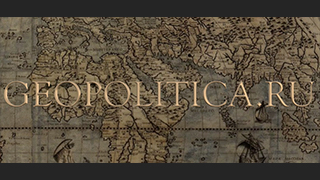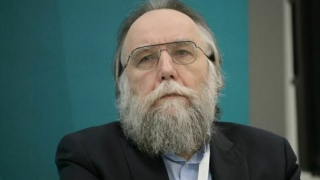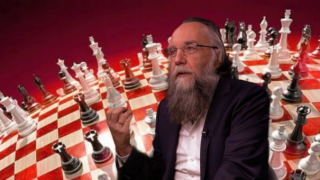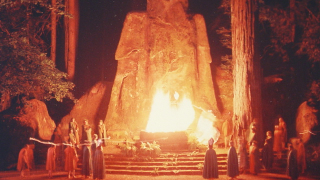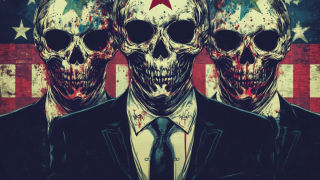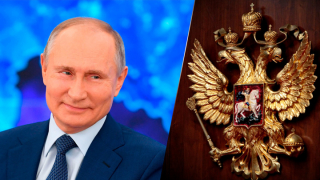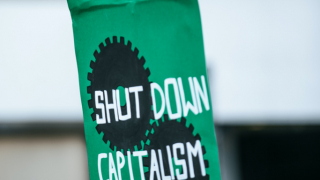Anticipating the turn: “right-wing anti-capitalism”
During the pandemic and politically tense year 2020 (which is now perceived almost as the last century), Alexander Dugin conversed with Dimitri Rode on Aurora Radio. Their text, now published as a book “Right-wing anti-capitalism. Paths of a Sovereign Thought”, was published in a different historical situation. It is even more interesting to reread and rethink these 22 conversations (the number, of course, is not accidental: its symbolism is well known to connoisseurs of Tradition). It would be more correct to call them philosophical dialogues: D.V. Rode (and in one of the conversations also A.V. Kazakov) do not act as passive interviewers, but as accomplices of Socratic maieutics, expressing their own opinions and contributing to the discovery of truth in a philosophical conversation.
Strictly speaking, not all dialogues are specifically about “right-wing anti-capitalism”. This theme is dominant in the first, fourth and tenth conversations, and this idea can and should be developed by referring to the whole spectrum of non-Marxist socialism (“feudal socialism”, “Christian socialism”, etc.), a model of which Dugin, throughout the book, calls Sergius Bulgakov's Philosophy of Economics, bringing it back to Aristotelian insights (economics vs. chrematistics). For our part, we would like to draw attention to the great potential of the foreign founders of this current of socio-economic thought in the 19th century [1].
But the thread running through the book is much broader. All 22 dialogues are permeated by the thesis that the continuation of the status quo cannot be maintained for long, neither in Russia, nor in the CIS, nor in the West. The blatant social injustice, the feeling of which was exacerbated in the population during the coronavirus, has not disappeared, although in the current period at least real, if insufficient, attempts by the Russian leadership to mitigate it have begun. Many who read “Right Anti-Capitalism” would do well to refresh their memories on how in 2020 popular consciousness reacted sharply to the inconsistent oscillations of all governments, tossed between the discontent of the masses and capitalist denial of social justice. Dugin and Dmitri Rode repeatedly spoke of finding that social stratum that could become the pillar of society's recovery from capitalist social Darwinism. There were no good options: the last year of the Trump administration was marked by a desperate battle between global dictatorship and local national dictatorships, as discussed in the second dialogue, and now the world is reaping the fruits of this confrontation.
Right-wing anti-capitalism” repeatedly talks about the victims of this clash. They are the migrants, the fruit of the capitalist system (3rd dialogue), the middle strata, the “deep people” and the inhabitants of the border regions. But the victims are also truth, freedom of speech and cultural traditions - the conversations took place during the BLM pogroms in the United States and the demolition of monuments, in relation to which Trump's speech to counter this threat was discussed - and, of course, Trump's utter impotence in offering a viable alternative to the Democrats' black totalitarianism (8th, 9th, 13th dialogues). The thoughts of Dugin, Rode and Kazakov often turn to Christ and the Church as a bulwark and refuge in difficult times, but again the year 2020, with the quarantine of churches, has led to the need to find difficult solutions such as home worship (2nd conversation). The reassessment of values inevitably led the thinkers to the apologia of work as a creative value, of man's co-working with God, of the foundations of Sophia's economy, which once again poses with certainty the question of the evil of capitalism as a complete negation of the millennial Greco-Roman and Christian Tradition (4th Conversation). The dialogues propose the idea of a united front of “left” and “right” with the goal of uniting power, sovereignty, state paternalism and social justice in order to destroy the libertarian “economic freedom” that has killed entire countries and peoples (5th Conversation). The inadequacy and méjeunesse of the system of the end of the USSR and post-Soviet Russia (but also Belarus and Ukraine), which tried to build a logically impossible local capitalism and was unable to meet this challenge, runs through many dialogues (3rd, 5th, 7th, 18th, 20th). The statements about the Russian authorities and bureaucracy in this book are extremely critical, which in 2023 even seems a bit unusual, but clearly shows in what a suffocating atmosphere, with a hopeless and unprecedented perspective of “Minsk without alternatives” in all spheres of society, we were living in about three years ago.
Accordingly, Alexander Dugin goes so far as to draw the systemic connection between liberalism and Social Darwinism, racism, Nazism, unipolar dictatorship and the cult of the atomic individual (10th dialogue). The extreme degree of intolerance of planetary liberalism, which declares its opponents to be simply nonexistent, is emphasized (17th and 22nd dialogues). This liberalism, which began with the abolition of all traditional human ties and identities, ends with the abolition of man himself (“Man is erased!”) and his replacement by cyborgs and artificial intelligences (21st and 22nd dialogues). In opposition to this, he talks about the orthodox conception of society, popular self-government and the principle of subsidiarity, the rejection of capitalism by Russian culture, both left and right, the possibility of popular government by soviets and starostamas, and the significance of the format of the Zemsky Sobor (2nd, 5th, 14th dialogues). Regarding specific political forms, Alexander Dugin states that: “Monarchy is an ideal regime, in my opinion. But when it loses contact with the people, when it begins to oppose the people, when it ceases to perform its sacred function, then it loses its legitimacy before History, God and Providence” (9th dialogue).
Of particular importance are the processes of restructuring the educational system, developing a unified educational canon and breaking the monopoly of liberal globalists on education (15th and 16th dialogues). It is the educational system and the cultural system, especially the theater (19th conversation), that are capable of growing a counter-élite that will eventually change the vector of the country's development and break the grip of liberal culture. The basis of this counter-élite, which arises from the bowels of the people, is orthodox ethics, the concept of conscience and sacrifice, because only sacrifice can stop the spiral of mutual violence and revenge (14th and 17th dialogues)-an idea that sounds unexpectedly relevant in the days of the escalating Middle East conflict. Of course, in a concrete political dimension, these values lead to the theses about Russia's spiritual sovereignty and a multipolar world (dialogues 14 and 18).
All the dialogues considered, recorded in difficult times, appear today as a foreshadowing of those colossal changes in the world order, which took place in 2022 and 2023 and will, of course, continue to occur. Moving beyond superficial indignation at the globalist dictate, Alexander Dugin and Dmitri Rode go to the secular roots of the crisis of the modern world and find “ways for sovereign thinking” to heal the dislocation of the times. This work is monstrously difficult and does not promise guaranteed success, but it is so necessary in these days of decisive battles that no one can refuse it. Either man and humanity will live, or capitalism and liberalism-a social order not for men, or rather, for non-humans (it is easy to imagine what the late Vladimir Kutyryov, one of the most consistent opponents of cyborgisation and transhumanism in Russian philosophy [2], would say about this). Faced with this alternative, all private contradictions pale and the very fate of existence is put in the balance.
Notes:
[1] Medovarov M.V., “The Becoming of Feudal and Christian Socialism in British Social Thought of the First Half of the Nineteenth Century”, Notebook on Conservatism. 2022. № 4. С. 129-142; Medovarov M.V, “The Becoming of Feudal and Christian Socialism in British Social Thought of the Second Half of the 19th - Early 20th Century and its Perception in Russia”, Notebook on Conservatism. 2022. № 4. С. 169-182.
[2] Kutyryov V.A., “Reason versus Man (Philosophy of Survival in the Age of Postmodernism)” M., 1999; Kutyryov V.A. “Culture and technology: the struggle of worlds”, M., 2001; Kutyryov V.A, “Philosophical image of our time: lifeless worlds of posthumanity”, Smolensk, 2006; Kutyryov V.A., “The human and the other: the struggle of worlds”, SPb., 2008; Kutyryov V.A., “Genesis or Nothingness”, SPb., 2010; Kutyryov V.A., “Vremya Mortido”, SPb., 2012; Kutyryov V.A., “The Last Kiss. Man as tradition”., SPb., 2015; Kutyryov V.A., “Away with progress: eschatology of life in the technogenic world”, SPb., 2016; Kutyryov V.A., “Chelo-vek tekhnologii, civilisation falschizma”, SPb., 2022.
Translation by Costantino Ceoldo




